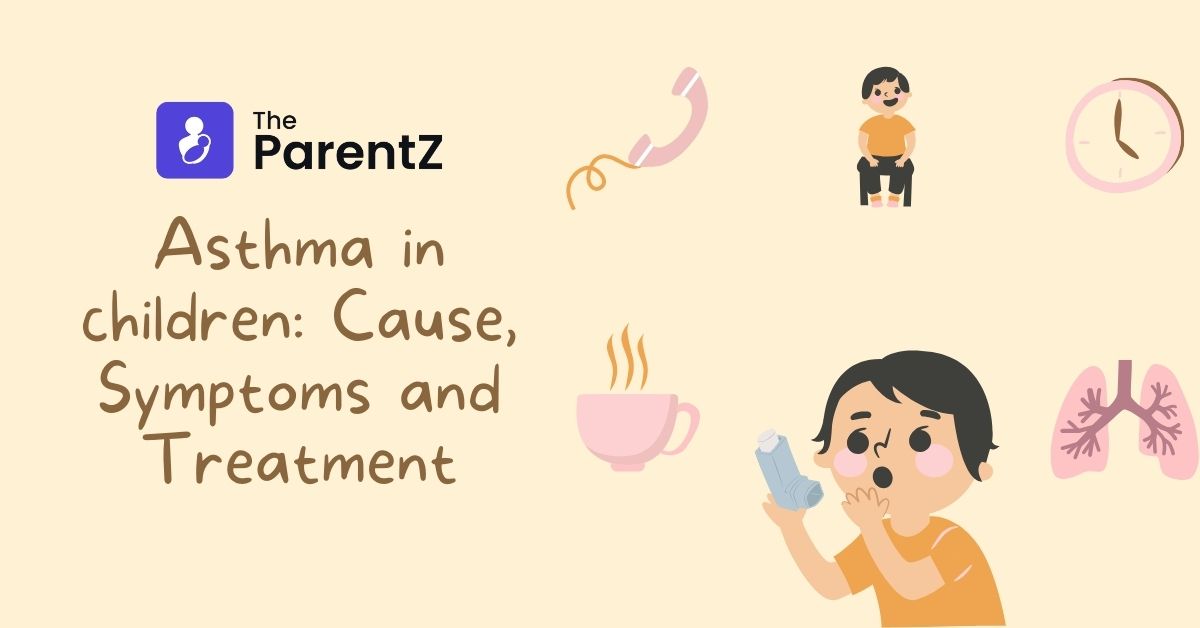Asthma is a chronic condition of the airway tract. Paediatric asthma does not differ much from adulthood asthma if we talk about the causes and the treatment modalities. What makes it different is the unique set of challenges that children face at a young age. Chronic asthma often leads to repeated hospital visits, lifelong treatment, limited physical activity and school absenteeism.
What is paediatric asthma?
Paediatric asthma refers to asthma which develops and is diagnosed in childhood. Asthma is a chronic condition of the lungs and the airway tract. The bronchus, trachea and the alveoli of the lung which are responsible for carrying and exchange of gases become inflamed due to various triggers. This inflammation can make them swell up and this narrows the airways. This narrowing leads to difficulty in breathing which may manifest as chronic coughing, heaviness of chest and wheezing.
What causes asthma in children?
The exact cause of asthma is not yet known but allergy and inflammation seems to be the main underlying reason. Asthma can be triggered by a number of factors. Broadly speaking an asthma attack can be caused due to an allergic reaction to external stimuli or due to a response to external factors which are not allergic, that is – Allergic asthma and Non allergic asthma.
The most common causes for allergic asthma include the following-
- Dust
- Hay
- Moulds
- Mites
- Pet dander
- Pollen
- Pests
The common triggers for non allergic asthma attacks on the other hand are-
- Exposure to cold air
- Air pollution
- Exposure to cigarette smoke
- Chemicals used in household cleaners
- Exposure to extremes of temperature
Is my child at risk for asthma?
Like any other medical condition, there are a few conditions which predispose a child to asthma. These factors which increase the probability of a child developing asthma are –
- Genetics and Family History : Children whose parents or siblings have been previously diagnosed with or treated for asthma have a higher risk of developing asthma.
- Race and ethnicity : Children of the African races are more likely to develop asthma as compared to the others
- Exposure to secondhand smoke : Children who have a long duration of exposure to secondhand smoke during young age or exposure of mother to secondhand smoke when pregnant are at a higher risk for developing asthma.
- Pre-existing allergies : Children who have and are being treated for other allergies simultaneously such as food allergies or contact dermatitis have a higher chance of developing allergic asthma as well.
- Sex : Asthma is more common in males when younger while in teenagers it is more common in females.
- Age : The most common age for diagnosis is between 5-17 year for allergic asthma
- Pre-existing health issues : Children with pre-existing problems such as obesity are more likely to develop asthma.
- Repeated infections : Children who suffer from respiratory infections repeatedly are more at risk for developing asthma.
When should I seek medical attention for my child?
There are some common symptoms which can be identified by a parent and indicate that a child needs medical checkup for asthma or other respiratory issues. These include –
- The child coughs frequently
- Chronic coughing of a child which worsens when the child suffers from a viral infection.
- Child starts huffing and breathing heavily on physical exertion.
- A whistle like sound can be heard when the child is breathing out
- There is often shortness of breath or difficulty breathing
- Children may have disturbed sleeping and wake up several times at night due to difficulty breathing.
- The child complains that the chest feels tight and congested.
- All the symptoms and signs mentioned above are usually worse during nighttime.
- Respiratory troubles develop during a specific time every year cyclically such as during the pollen season.
Summing up
Asthma is a lifelong condition which unfortunately cannot be cured by any intervention. The only possible management is lifestyle modification and proper compliance with medications which can control and arrest the course of the disease.
Asthma may seem like a very cumbersome disease but proper prevention and treatment can help your child lead an almost normal life and limit flare ups of the disease. Your doctor can help you develop an asthma care plan with meticulous instructions related to the medical needs of the child. Following this plan with the help of your doctor and educating the child about his/her needs can help manage asthma.





Be the first one to comment on this story.